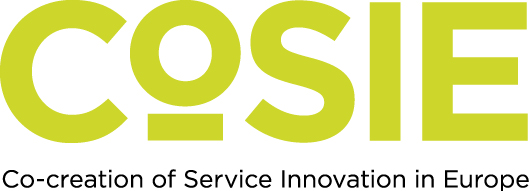ICT Initiatives in the Public Sector: The Whole Is More Than the Sum of Its Parts

Our CoSIE train set off in January, though perhaps CoSIE has been more akin to a rollercoaster than a train. We started by making an inventory of public service innovation with co-creation and the use of ICT. All work package leaders were busy working out their plans for the years to come. Meanwhile, four months have passed. A state of the art for co-creation, examples of co-creation with use of big data, social media and other ICT tools were being studied and delivered. We also worked hard on plans around the practical cases. The Communication and Dissemination plan was made in co-creation with all the national partners and we also got a better view on how everybody is tackling different issues.
The Dutch national and local governments are moving fast, implementing big data platforms, developing block-chain technology to enhance knowledge gathering and enabling big cities to foresee and act on social problems before they actually take place. Through the use of big data, policy making strategies are adapted based on scenarios and algorithms from the datasets. The use of these technological tools should improve service delivery, bring greater efficiency and eventually lead to the reduction of social problems.
The cities of Amsterdam, Rotterdam, Utrecht and Tilburg are all working in pluridisciplinary platforms where policymakers, researchers and technology specialists work together on the development of smart cities and new public services. Issues related to: circulation, infrastructure, logistics or water management are at the heart of the co-operation between municipalities and experts in the field of data. Developing Smart Governance for a Smart Society.
The Municipality of Zuid Horn, developed a new service for vulnerable families with a minimum income. The Child-package consists of 300 euros per child, permitting them to participate in social activities, sports, culture etc. Local entrepreneurs and a variety of organizations are linked via the scheme. Using block-chain technology allows municipalities to link more entrepreneurs and local organizations/ entrepreneurs to the initiative. Furthermore, vulnerable families have greater freedom in choosing how to spend these 300 euros.
However, working on all these issues I could not stop thinking about the Aristotelian idea of totality: “The whole is more than the sum of its parts”. The interconnectedness between goods, services and people might not only produce commodity and efficiency, it might also lead to unforeseen negative (side) effects. Things we did not and could not foresee, because we do not know how all these new activities interrelate.
Block-chain applications in public service delivery regulate the bureaucratic network through the internet. Connections are made automatically, instantly and irreversibly based on trust that the technology will make the right choice. However, the system operates like a big black box. We do not know what happens in it: What happens with these interconnected datasets and who is responsible for the management and safety of these data?
Instead of pushing self-reliance, it might increase dependency, as people no longer have to think for themselves. Data and technology might become a truth in itself that is incomprehensible for the public.
Service delivery through block-chain could lead to greater anonymization, exchange through computer interfaces and text boxes, meaning the reduction of face to face conversation and human contact and exchange.
The technological system, connecting people, goods and things might not always function correctly or be harnessed correctly by users. Software engineers and computer scientists have complained for years about the inefficient use of data technology in business and public services, leading to data errors and inefficiency. Business and governmental organizations do not often want to invest in cleaning up the system. What about the unforeseen effects of interconnecting the errors? We think the results are trustworthy but what if they produce wrong information based on partial data errors? Technology can fail, because it is also a human invention.
Co-creation is a fundamental prerequisite to bringing about public service innovation with new technologies and building the future. Users, developers, policymakers and other stakeholders start a conversation and reflection based on shared values. Do we wish for a Smart Society and Smart Governance? If so, how do these new terms relate to human values such as sharing and caring, dignity and trust? The current debate around Cambridge Analytica and the use of Facebook serve as a wake-up call.
Let us keep Aristotle in mind during the CoSIE project. The future is ours; let’s create it together for human development and common good. “The whole is more than the sum of its parts”.
Sandra Geelhoed
Senior Lecturer and Researcher, School for Social Work
HU University of Applied Sciences, Utrecht, The Netherlands
